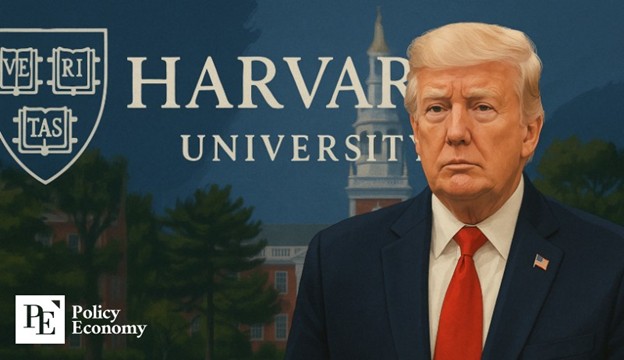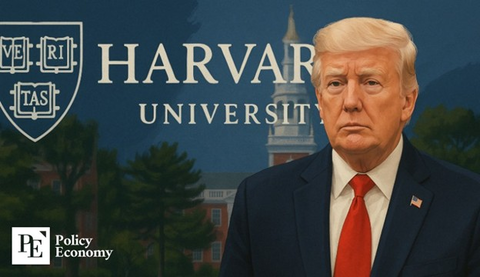Input
Modified

In a stunning escalation of its campaign to overhaul American higher education, the Trump administration has once again targeted Harvard University—this time by canceling $450 million in federal funding. The move is the latest salvo in what has become a high-stakes ideological war between the conservative administration and progressive academic institutions. At the heart of this intensifying standoff are conflicting visions of education, free speech, diversity, and institutional independence.
For the Trump administration, elite universities like Harvard represent what it sees as bastions of progressive ideology, perceived to be out of touch with mainstream American values. For Harvard, the administration’s actions represent an unprecedented assault on academic freedom and the university’s constitutional rights. The conflict, already fierce, appears to be heading toward an all-out confrontation.
Funding Canceled Amid Antisemitism Claims and DEI Backlash
On May 13, a “Joint Task Force to Eliminate Antisemitism” led by the U.S. Department of Education notified Harvard University that it was revoking $450 million in federal support. The decision, according to officials, stemmed from Harvard’s alleged failure to address campus-wide racial discrimination and antisemitic harassment, particularly within its law school’s peer review process for academic journals.
Yet beyond these stated reasons, many observers—and Harvard itself—point to a broader motive: a full-scale political and ideological offensive against what the Trump administration views as a corrupted academic system. In recent months, administration officials have openly criticized Ivy League universities such as Harvard, Columbia, and Princeton for what they allege is a lax response to anti-Israel activism and a campus culture they deem hostile to conservative values.
Central to the administration’s grievances is the presence of DEI (Diversity, Equity, and Inclusion) programs. Officials have demanded the complete dismantling of these frameworks, accusing them of fueling ideological bias and antisemitism. The Trump administration has called for sweeping reforms, including new restrictions on student and faculty influence and stricter federal oversight of university curricula and administration.
Harvard, however, has not stood idly by. The university has forcefully rejected the administration’s directives, defending its policies and asserting that such demands amount to federal overreach and an attack on its foundational principles. The timing of the $450 million funding cut was no coincidence: it came just days after Harvard President Alan Garber submitted a formal letter of opposition to Education Secretary Linda McMahon.
Billions Frozen: A Campaign of Financial Coercion
This latest round of funding cancellation is not the first financial blow struck by the Trump administration against Harvard. Just weeks earlier, on April 11, the administration sent the university a letter outlining its dissatisfaction with Harvard’s academic and civil rights performance. The letter listed ten conditions Harvard would need to meet to maintain its financial relationship with the federal government.
These included reducing the authority of students and non-tenured faculty, identifying and reporting students deemed “hostile to American values,” and contracting a government-approved external agency to audit university programs alleged to be promoting antisemitic content.
President Garber responded swiftly and unequivocally. On April 14, he issued a public statement rejecting the administration’s terms, declaring that Harvard’s legal counsel had reviewed the demands and found them incompatible with the university’s mission and legal rights. “We will not surrender our independence or our constitutional rights,” he stated in a letter to the Harvard community.
The consequences were immediate and severe. The Trump administration responded by suspending $2.2 billion in long-term federal grants and freezing an additional $60 million in existing contracts. White House Press Secretary Caroline Leavitt justified the decision by stating that President Trump wanted Harvard to “apologize for the horrific antisemitism” on its campus and insisted that the university “must follow federal law.”
These sweeping punitive actions, critics argue, signal a deliberate strategy of coercion—one that uses financial leverage to force universities into ideological conformity. Supporters of the administration counter that federal dollars should not support institutions they believe are promoting discrimination or undermining national values.

Targeting Tax-Exempt Status: A Threat to Institutional Survival
Perhaps the most explosive development came on May 2, when Donald Trump publicly threatened to revoke Harvard’s tax-exempt status. In a post on his Truth Social platform, the former president declared: “We are going to strip Harvard of its tax-exempt status. They deserve it.”
Under current U.S. tax law, institutions like Harvard enjoy broad exemptions due to their nonprofit educational, religious, or charitable nature. However, those exemptions can be revoked if the institution engages in political activity or violates regulations. Trump’s statement suggested he believes Harvard has crossed that line.
Harvard’s leadership strongly pushed back. In an interview with The Wall Street Journal, President Garber called the threat both unreasonable and unlawful. “Unless there’s a reason unknown to us that could justify such a drastic action, this move would be highly illegal,” he said.
Garber also emphasized the critical role tax-exempt status plays in allowing educational institutions to fulfill their missions. “It is granted so that educational institutions can fulfill their teaching mission, and research universities can carry out their research mission,” he stated. “If we lose that status, it would severely undermine our ability to fulfill these responsibilities.”
The threat to revoke Harvard’s nonprofit privileges—combined with massive funding cuts and compliance ultimatums—marks a new level of pressure. Critics warn it sets a dangerous precedent of using the tax code and federal purse strings as political weapons. For Harvard, the battle is now not only about money, but about its very identity as an independent academic institution.
As the showdown continues, the Harvard-Trump feud has become more than a clash over DEI or campus speech. It is now a defining test of the boundaries between government authority and institutional autonomy. With billions on the line and constitutional principles at stake, this confrontation could reshape the landscape of American higher education for years to come.













